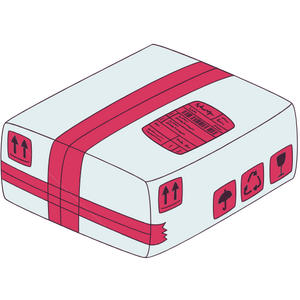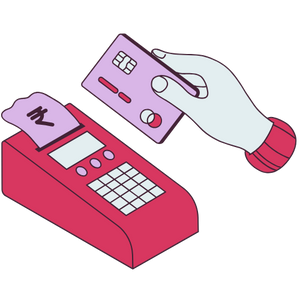Menstrual cycle disorders: irregular periods, explanations and solutions

Is your menstrual cycle full of surprises? Despite your calculations or what your period tracking app says, do your periods suddenly show up when you weren’t expecting them at all? Or are your cycles wildly different and unbalanced – very long then short, with a light flow then very heavy? In short, total chaos! You’re dealing with irregular periods or an irregular menstrual cycle.
With these atypical periods, it’s hard to stay organized. You always have to carry an emergency pair of period panties (just in case), and for those who want to get pregnant, it’s also more complicated! Disordered female cycles can cause several major issues in a woman’s life.
No taboos here: many women unfortunately experience this! For many different reasons, they’ll have disrupted periods – short, prolonged, absent or occurring several times in one cycle. A real mess we’d all rather avoid!
So today, Louloucup is giving you a few explanations and possible reasons for irregular periods and menstrual cycle disorders, as well as some potential leads and solutions to help fix the problem.
We’ll start by defining exactly what irregular periods are, then talk about the reasons behind them (birth control, stress, infections, etc.).
In this article
🌻 First of all, what exactly do we mean by irregular periods?
The term “irregular periods” covers a huge range of situations. So let’s start with a definition:
Periods are considered irregular when they arrive at an unexpected time, earlier or later than your usual rhythm. You notice several days’ delay or several days’ advance compared with what you expected. The first day of your period is therefore a surprise you discover when you go to the bathroom. It’s neither practical nor pleasant. It can cause stress and catch you off guard. Your underwear may get stained. It’s uncomfortable.
Is it possible to be pregnant and still have your period?
Your periods are irregular if they don’t last roughly the same length of time from one cycle to the next. For example, your bleeding might last 5 days, then only 2 days the next cycle, then 7 days the following one, etc. As a reminder, regular periods usually last between 3 and 6 days.
The same goes for the intensity of your menstrual flow and bleeding. Periods are irregular if you notice light bleeding (oligomenorrhea) followed by particularly heavy bleeding in the next cycle (menorrhagia).
What you really need to remember is that we talk about irregularity when your periods don’t look the same from one cycle to the next (volume, intensity, duration, frequency, etc.).
🌻 What can cause irregular periods?
It’s important to understand your menstrual cycle, your body and its signals. A regular, well-regulated cycle is a sign of a healthy body. On the other hand, if you notice several abnormalities or irregularities, you’re right to ask questions—without panicking. Many very different causes can affect your period, its timing, intensity or frequency.
Contraception
Contraception is one of the main reasons. Hormonal contraception disrupts your cycle by preventing ovulation. The pill, the hormonal IUD or the subcutaneous implant all alter your periods. This may suit some women who prefer not to have them. Others prefer to keep having them for reassurance.
Stress
A major psychological event, emotional shock, significant stress or extreme fatigue can all affect your period. Jet lag, depression, exam stress, a bereavement, trauma after an accident or even high‑level sports can, unsurprisingly, disrupt your cycles or stop your period altogether (amenorrhoea).
A dietary issue
Significant weight loss (underweight) or gain (overweight), obesity, anorexia and eating disorders (bulimia) all disrupt a woman’s menstrual cycle.
Postpartum
After giving birth, your periods (known as the return of menstruation) can take some time to settle down. Irregular periods may occur without being a cause for concern. It can take several cycles for everything to get back to normal. The return of your period usually happens about 2 months after birth if the new mother is not breastfeeding. If you are breastfeeding, however, your periods are delayed for the duration of breastfeeding. Prolactin (the hormone produced during nursing) delays ovulation and therefore your periods.
Puberty
Irregular periods are often seen in adolescence during the first cycles; this is completely normal at puberty.
Pre-menopause
It’s also completely normal to notice changes after the age of 45. Women going through **perimenopause** should not worry about this. An irregular menstrual cycle is one of the symptoms of **menopause**.
Certain medications and treatments
Certain medications can interfere with your period. Heavy treatments (chemotherapy, etc.) as well as other specific drugs can affect your menstrual cycle and make it irregular.
Certain illnesses
Certain conditions can disrupt your cycle (endometriosis, PCOS – polycystic ovary syndrome, thyroid, pituitary or hypothalamic dysfunction, or polyps, fibroids, benign tumors). In these cases, irregular periods can be a symptom and a warning sign about your health. Once again, we strongly encourage you to see a competent healthcare professional who can answer your questions, address your concerns and carry out the appropriate tests.
🌻 Irregular periods: when should you worry?
As mentioned earlier, you should be concerned if you notice other symptoms alongside irregular periods: pain, acne, excess hair growth, very heavy bleeding, or bleeding between periods.
Pay attention to these issues and don’t hesitate to talk to a qualified healthcare professional who can reassure you and/or carry out more in-depth tests to rule out possible illnesses. Your GP, gynecologist or midwife are there to answer all your questions. When should you make an appointment?
In case of severe pain
When your irregular periods are accompanied by sharp, intense pain that’s hard to cope with day to day (known as dysmenorrhea).
In case of sudden change
When you’ve always had a regular cycle and suddenly everything goes off track (heavier or on the contrary lighter), much longer or much shorter than before.
If several types of pain occur at the same time
When you’re dealing with several issues at once: pain during sex, lower back pain, pelvic pain, dysmenorrhea, etc.
🌻 Is it really possible to get your period back on track?
So are there solutions for having a regular menstrual cycle? Natural treatments? Home remedies? Or necessarily a more supervised treatment by a doctor? It's hard to say. First, you need to know the reasons for these disorders and treat them.
Review your birth control
Some combined estrogen–progestin contraceptives (see our dedicated article Contraception & Periods) based on hormones (estrogens and progesterone) allow you to have your period on a precise, predictable day.
The **low-dose pill** or 21-day combined pill + 7 days of placebo tablets creates regular, predictable “periods.” These are artificial bleeds, mainly there to reassure women, and they can even be skipped. The same goes for the **vaginal ring** or the **contraceptive patch**. **Withdrawal bleeding** occurs in the fourth week. Hormonal treatment is therefore often a good solution for women whose periods are very irregular or problematic.
Self-care
For both your comfort and your hygiene, it’s recommended that you change your menstrual protection regularly. If you’re wearing a tampon or pad, go to the bathroom to change it according to your flow. This helps prevent bacteria growth, bad odors and maceration.
A quick reminder:
To wrap up, we have to stress the importance of a good menstrual routine. Your period can be irregular, but it should never be uncomfortable with our **period panties** and **Loulou menstrual cups**! Equip yourself with the best period products to enjoy dry, worry-free period days. Don’t wait any longer and grab your set of Louloucup menstrual products now!
 Did you like this article? Pin it!
Did you like this article? Pin it!


































